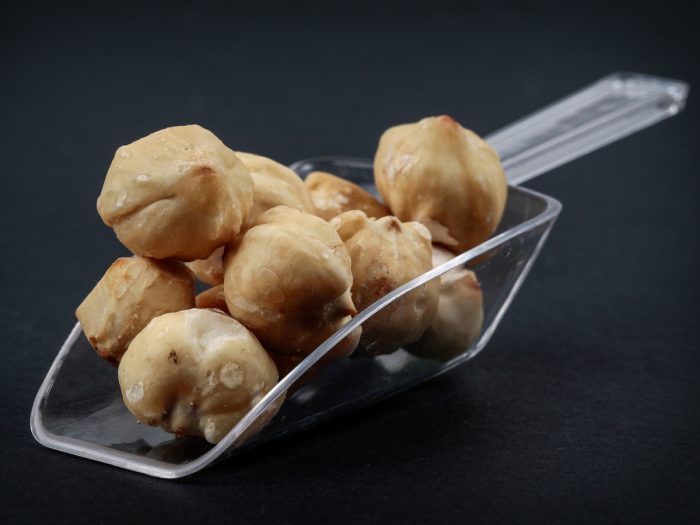Kukui nut oil may have many notable benefits and uses which may include moisturizing the skin, preventing wrinkles and crow’s feet, soothing muscle aches and pains, protecting the immune system, eliminating inflammation, strengthening the hair, preventing dandruff, speeding wound healing, and neutralizing free radical damage, among others.
What is Kukui Nut Oil?
Kukui nut oil is derived from the state tree of Hawaii, the kukui nut tree, which is commonly known as the candlenut tree. Most commonly used as a massage oil, kukui nut oil is expeller pressed from the large nuts of the tree, which bears the scientific name Aleurites moluccanus. [1]
For thousands of years, the indigenous people of Hawaii have used this oil in religious ceremonies, paints, varnishes and even candle-making. However, it has become known to the wider world because of its impressive topical benefits to the skin and hair, as well as the immune system and muscles.
The long list of benefits derived from kukui nut oil is attributed to its high level of poly and monounsaturated fats, linoleic and linolenic, as well as vitamins C, D, E and other powerful antioxidants.
Benefits & Uses of Kukui Nut Oil
People often use kukui nut oil when they struggle with joint pain, a weak immune system, arthritis, psoriasis, eczema, dry skin, dandruff, wrinkles, and premature signs of aging, blemishes, burns, scars, fresh wounds, split ends, hair loss, stretch marks, and sunburn.
May Increase Hair Strength
A popular traditional use of kukui nut oil is to apply it to the hair in the form of a hair mask, mixing it in with shampoos or conditioners, or simply massaging it into the scalp and tips of the hair. The linoleic and linolenic fatty acids that may be found in this oil are able to coat the hair, delivering key nutrients, moisturizing it, preventing breakage, and even improving the appearance and luster of hair. [2]

The kukui nut tree in Hawaii has played an important plant in traditional culture and lifestyle. Photo Credit: Shutterstock
Might Prevent Dandruff
As an emollient substance, kukui nut oil is able to coat the skin and lock in moisture, thus preventing dry skin and dandruff that inevitably follows. This possibly moisturizing quality of the oil also helps keep the hair follicles healthy and functioning, which can help prevent premature hair loss. [3]
May Control Eczema
One of the most difficult skin conditions to keep under control is eczema, but kukui nut oil is not only able to deliver moisture to the skin, but can also hold it there, effectively soothing inflammation and preventing itchiness. This nut oil is also effective against symptoms of psoriasis and rosacea. [4]
May Moisturize Dry Skin
Dry, cracked skin of the hands and other parts of the body is not only painful but a perfect breeding ground for infection. If you regularly work with your hands or are often exposed to the elements, applying a sheen of kukui nut oil can prevent easy breakage of the skin, and promote the growth of new cells. [5]
Might Heal Wound
If you experience a scrape, scratch, bruise, cut or abrasion, you can apply a diluted form of kukui nut oil to the wound in order to speed healing, relieve pain and eliminate swelling, while also protecting the wound from possible infection. [6]
Might Minimize Appearance of Wrinkles
As we age, there are certain things that are unavoidable, such as wrinkles and age spots, but this potentially antioxidant-rich oil is able to counter those effects, boosting collagen production and stimulating the sloughing of dead skin cells to make room for healthy new ones. In the case of stretch marks, for pregnant women or people experiencing rapid weight fluctuations, applying this oil daily can help minimize their appearance.
May Lower Inflammation
The most popular use of kukui nut oil is in massage and is still widely used today for this purpose. The rich blend of fatty acids, which have possibly anti-inflammatory effects, can be absorbed into the skin and help soothe sore muscles and joints, which is also why this oil is commonly used by people who suffer from arthritis. [7]
Can Act as Analgesic
If you suffer from chronic pain or have recently experienced a surgery or injury, use of this oil is recommended in moderate amounts. Kukui nut oil is also a popular choice for burn relief, as it can quickly inhibit pain receptors and numb inflamed areas. [8]
Can Boost Immune System
With possibly rich amounts of vitamin E and vitamin C, this oil is packed with antioxidants and immune-boosting potential. Your skin is exposed to countless pathogens and irritants every day, but if you regularly apply kukui nut oil, particularly to the hands and face, you can give your skin an advantage when it comes to fighting infections. [9]
Side Effects of Kukui Nut Oil
There are few reported side effects of kukui nut oil, but some people report skin irritation and stomach upset, often when the oil is used in large quantities.
- Stomach issues: Kukui oil may be versatile and packed with nutrients, but it is also extremely susceptible to heat. Although kukui oil is rarely consumed internally, it is not generally considered toxic, but if the oil has already passed its shelf life, or has been exposed to excess heat, it can cause stomach upset, nausea, diarrhea, and other unpleasant gastrointestinal side effects.
- Skin inflammation: As with any potent natural oil, kukui nut oil can cause inflammation on the skin, particularly for people with sensitive skin, or those who have an allergy to the kukui nut tree. In order to avoid this, apply a small amount of this oil to a patch of skin and wait a few hours to see if any redness or itching appears before putting it on a larger area of your body.
